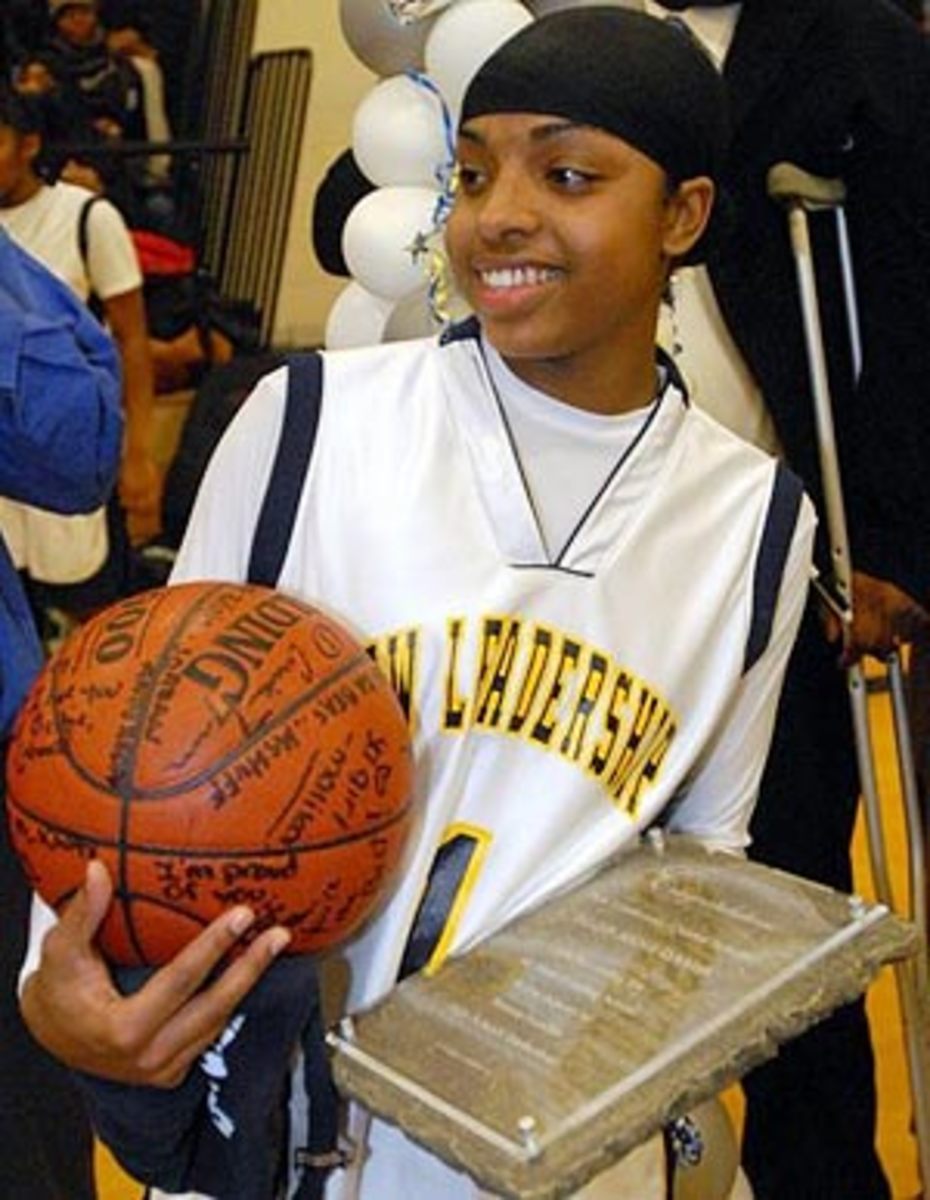Enlightening the Clothes-Minded


How does she do it? In the face of triple teams, with defenders all but linking their arms like paper dolls, Bilqis Abdul-Qaadir is able to exploit the limited daylight she gets and average 42 points a game.
How does she do it? Passing Rebecca Lobo's 17-year-old Massachusetts high school mark of 2,710 career points is about as easy as bumping Julie Andrews off the hilltop, and yet Bilqis graciously eclipsed the legend in January on her way to becoming the first player in state history -- male or female -- to score 3,000 points.
How does she do it? For the last four seasons --beginning one year after her 43-point varsity debut as, yes, an eighth-grader -- the 5-foot-3 1/2 Bilqis has played for New Leadership Charter School in Springfield in full Muslim dress, arms and legs covered beneath her uniform, wearing a head scarf, or hijab.
Bilqis doesn't mind remarks rooted in curiosity; it's the questions out of ignorance that she meets with a confident rejection. "When some people come at me with, 'Oh, is that a tablecloth on your head?' -- it's like, really, don't," Bilqis (pronounced Bill-KEACE) said last Thursday, the day she ended her high school career with 51 of the Wildcats' 57 points in a regional Division III quarterfinals playoff loss. "If you're going to have that kind of question, don't ask me. But some people are truly honest in asking a question, like, 'Oh, I don't want to be rude, but why do you wear that?' That's the kind of question I'd rather answer."
So let's get the obvious out of the way: No, the perpetual motion point guard doesn't melt under her extra apparel. She ditched cotton a couple of years ago after discovering the blissful wicking power of Under Armour. "Saved my life," she says with a laugh. Since her freshman season Bilqis, the youngest of eight children in a bustling Muslim household in Springfield -- birthplace of basketball, site of her first Nerf hoop dunk at age three -- has not revealed a bare leg or biceps on the court. "In eighth grade, I wasn't covered," she says. "I looked like everybody else." The wardrobe transformation was by rule more than choice: Upon reaching puberty, an Islamic woman must cover herself in public, requiring Bilqis to endure the last thing next to acne an adolescent wants. The dreaded square peg.
"It really wasn't a decision. I had to," she says. "I had to get used to it, no matter how hard it was for me. I know the first few weeks in school kind of tested me."
It was still post-9/11. It was still preenlightenment. Some nights on the floor in visiting gyms, she would hear the catcalls derived from the fear of the unknown, shouted in stupidity: "Terrorist!" But slowly, the more heads she turned with her step-back threes and her sleights of hand, the more minds Bilqis opened. This wasn't grudging tolerance but joyous acceptance of an exceptional player and student. Not only does she possess a cashmere-soft touch and flinty defensive skills, but she's also on the honor roll, with an interest in premed and the stomach for the Discovery Health Channel. ("I'm good with the scalpel scenes," she says.) Bilqis has been embraced for all she is. With 1:23 to go before halftime on Feb. 17, the Wildcats' game was stopped for 10 minutes as the home crowd cheered her 3,000th point.
But such acceptance is hardly universal. It didn't go unnoticed to Bilqis last month when Shahar Peer, a Jewish tennis player from Israel, was denied a visa at the last minute for a WTA tournament in Dubai. In an instant that city, which is so Westernized it can seem like a gilded Disney of the desert, took a major step backward by entwining religion and sports.
"I really feel it shouldn't be that way," Bilqis says. "It shouldn't matter what god they believe in ... or what they do religiously during the day ... or what they have on their head. The question is, Can you play?"
Yes, she can. Bilqis is expected to become the first Islamic player in NCAA Division I history to take the basketball court in full dress when she starts her college career next fall on scholarship at Memphis. That's a long three from Springfield, far from the siblings and schoolmates who support her. "[My family] tells me, 'If you have to cry, cry and let it out,' " she says. "They say, 'Call home, talk it out.' " Bilqis has already found a little bit of home in Memphis, locating a mosque five minutes from campus. Still, she is about to enter the big time, in arenas packed with thousands instead of gyms with four-row risers. She'll be unmistakable.
That's Bilqis, in the hijab. It's the blur you see on her head fake to the basket. How does she do it? That's how.
